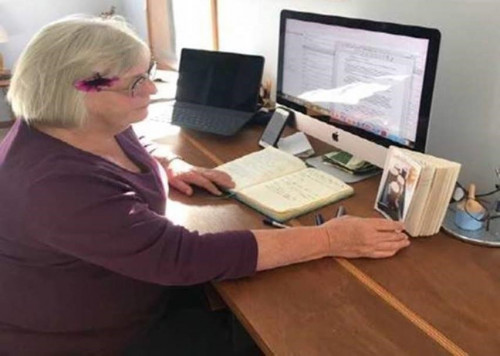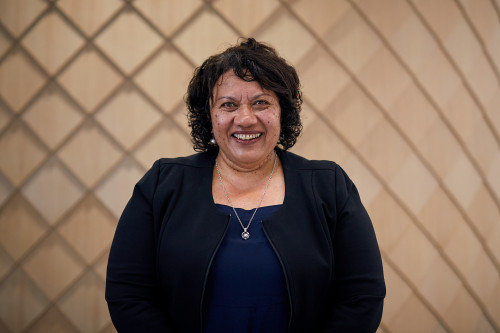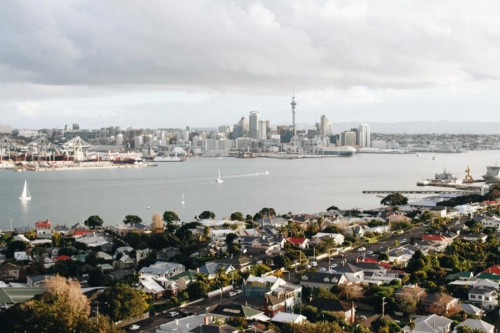Pānui May 2020 - COVID-19, written accounts, Commissioner Ali'imuamua Sandra Alofivae shares her story

Royal Commission Chair Coral Shaw working from home during lockdown
COVID-19 - What it means for the work of the Inquiry
Since 24 March the Abuse in Care Royal Commission has been working remotely. Our Tāmaki Makaurau (Auckland) and Pōneke (Wellington) offices have been out of bounds for staff and visitors since then and will remain so for the duration of Level 3.
The Commissioners and staff have been working from their homes around Aotearoa for the last six weeks.
For Royal Commission Chair Coral Shaw, this has meant daily Zoom, conference calls, hundreds of emails and virtual meetings. “Commissioners are meeting regularly. We continue to make important decisions through this lockdown period to make sure that the Inquiry’s work towards a final report is on track and progressing.
“The health, safety and wellbeing of survivors and our people is the number one priority and was an important factor in our decision to defer the scheduled public hearings. Soon we are going to announce the new dates for some of these hearings. In the meantime, there is a lot of work
going on behind the scenes to prepare for those hearings. Because of Covid 19 we had to suspend private sessions. Our staff are working directly with survivors to reschedule these face to face sessions so that we can hold those as soon as it is safe to do so. We have also approved some different ways that survivors can use to tell us their accounts and experiences.
“During this time, we have taken the opportunity to focus on long-term planning for the inquiry so that we can be in a position to share our plans for next year’s hearings and round tables. Importantly, we are closely considering the information we have received from survivors in private sessions, and from our contextual hearing last year. These accounts and evidence along with our research and investigations work will inform our interim and final reports,” says Coral Shaw.
The Royal Commission Contact Centre remains open from 8.30am to 4.00pm weekdays. Survivors or anyone needing information about the Inquiry are encouraged to get in touch with any questions. We are updating news about the Inquiry through Facebook, LinkedIn and on the Covid-19 page on our website.
------------------------------------------------------------------------------------------------------

Survivor written accounts now an option
Survivors can submit their experiences of abuse or neglect in care in writing. Written accounts do not replace private sessions – they simply provide an alternative way for people wanting to share their stories, where people do not want to do a private session.
Helena Dillon, Head of Survivor Accounts, says it’s crucial survivors have access to wellbeing support through the process of completing their written accounts. “We know that it takes courage to speak out and we also appreciate it can trigger anxiety, trauma and a range of other emotions
and for this reason if people are wanting to submit written accounts, they are requested get in touch with the Contact Centre. We will register you as a survivor, organise appropriate wellbeing support for you and outline how you can submit your written account. Support is also available so you can complete your written account.”
Survivors will need to sign a consent form giving the Commission permission to use their information, and personal information is removed so no one can be identified. All of the information received from survivors – whether through written submission, private session or public hearing – will be used to inform our research and reports.
Contact Centre details:
Free Call NZ 0800 222 727 or from Australia 1-800- 875-745 Monday to Friday, 8.30am-4.00pm (NZ hours) or email: contact@abuseincare.org.nz
----------------------------------------------------------------------------------------------------------------------

Commissioner Ali'imuamua Sandra Alofivae shares her Pacific story
Commissioner Ali’imuamua Sandra Alofivae was recently profiled in Pasefika Proud. The article titled Fulfilling the dream traces Sandra’s moving story from when her family moved to Aoteoroa from Samoa in 1968. It covers the tragedy of losing her father at a very young age and the brief trip back to Samoa for her father’s funeral and then the family’s subsequent return to NZ where her mother settled and brought up the family in South Auckland.
Sandra recounts first-hand the pressures that Pacific Island families face in New Zealand alongside the vibrant community of Mangere she grew up in, her faith, the journey through the education system and into legal practice in the 1990’s and into the Royal Commission.
It was through her legal work Sandra began to understand the social issues that eventually led to her role with the Royal Commission of Inquiry into Abuse in Care.
Sandra encourages the Pasefika community to come forward and share their stories. “Our work will only be as good as our ability to engage with Pasefika communities to hear their voices, which history has shown has often been marginalised in this space. Given the sensitivities around this vulnerable group, it’s both an opportunity and challenge to do this well. The Terms of Reference that guide the Commission’s work specifically refer to Pacific people. It acknowledges that Pacific people have been disproportionately over-represented in care.”
You can read the full story on the Pasefika Proud website.
---------------------------------------------------------------------------------------------------------

Tāmaki Makaurau presence - update on our Auckland office
COVID lockdown has meant our people are working remotely. Prior to going into our COVID response phases our Tāmaki Makauru (Auckland) office was up and running with staff coming on board at the premises in Khyber Pass to support our work with survivors in our largest city.
Construction work was underway on a new venue for public hearings and for private sessions. COVID-19 has delayed the construction, but contractors are now back on site to continue the good work in getting the space ready.
The premises in central Auckland have been designed with survivors in mind and the concept of the toroa, whānau and kaitiakitanga - respect for the environment and culture. The space makes the most of natural resources and has been designed in a way that is mindful of those that will be using it.
We will bring you more updates in future editions of Pānui.
